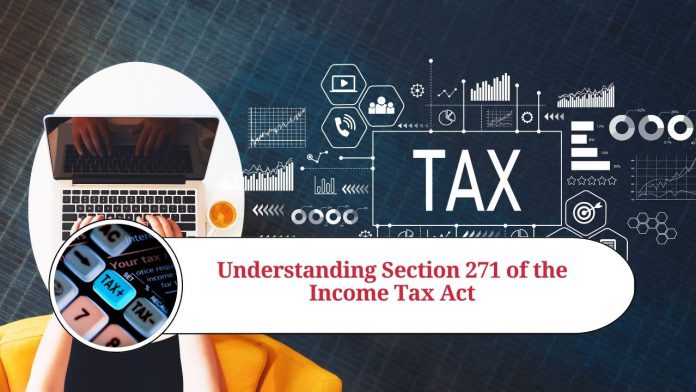Section 271 of the Income Tax Act deals with the penalties that can be imposed on taxpayers for various non-compliances. The section provides for penalties for several offenses such as failure to file tax returns, failure to maintain proper books of accounts, and understatement of income.
Penalties for Non-Compliance
One of the most common offenses that attract a penalty under this section is the failure to file income tax returns on or before the due date. A penalty of Rs. 5,000 can be levied if the return is filed after the due date but before December 31st of the assessment year. If the return is filed after December 31st, the penalty amount increases to Rs. 10,000.
Another non-compliance that attracts a penalty is the failure to maintain proper books of accounts. If a taxpayer is found to be maintaining inadequate books of accounts or not maintaining them at all, a penalty of 0.5% of the total sales or turnover can be imposed.
Understatement of Income
Section 271 also provides for penalties in cases of understatement of income. If the assessing officer finds that a taxpayer has understated their income, a penalty of 50% of the tax payable on the understated income can be levied. However, if the taxpayer can prove that the understatement was due to a good faith error or an omission, the penalty can be waived.
Misreporting of Income
The penalty for misreporting of income is even more severe. Misreporting of income occurs when a taxpayer deliberately furnishes inaccurate information in their tax return. If a taxpayer is found guilty of misreporting their income, a penalty of 200% of the tax payable on the misreported income can be levied.
Section 271 of the Income Tax Act: Understanding the Penalties
Section 271 of the Income Tax Act deals with the penalties that can be imposed on taxpayers for various non-compliances. The section provides for penalties for several offenses such as failure to file tax returns, failure to maintain proper books of accounts, and understatement of income. Let’s take a closer look at the penalties under Section 271:
Penalties for Non-Compliance
One of the most common offenses that attract a penalty under this section is the failure to file income tax returns on or before the due date. A penalty of Rs. 5,000 can be levied if the return is filed after the due date but before December 31st of the assessment year. If the return is filed after December 31st, the penalty amount increases to Rs. 10,000.
here are some frequently asked questions about Section 271 of the Income Tax Act:
What is Section 271 of the Income Tax Act?
Section 271 of the Income Tax Act provides for penalties that can be imposed on taxpayers for various non-compliances, such as failure to file tax returns, failure to maintain proper books of accounts, and understatement of income.
What are the penalties for non-compliance under Section 271?
The penalties for non-compliance under Section 271 vary depending on the nature of the non-compliance. For example, the penalty for failure to file income tax returns can be up to Rs. 10,000, while the penalty for failure to maintain proper books of accounts can be 0.5% of the total sales or turnover.
What is the penalty for understatement of income under Section 271?
If the assessing officer finds that a taxpayer has understated their income, a penalty of 50% of the tax payable on the understated income can be levied.
What is the penalty for misreporting of income under Section 271?
If a taxpayer is found guilty of misreporting their income, a penalty of 200% of the tax payable on the misreported income can be levied. In addition, the taxpayer may also face prosecution under the Income Tax Act.
Can the penalty under Section 271 be waived?
In some cases, the penalty under Section 271 can be waived if the taxpayer can prove that the non-compliance was due to a good faith error or omission. However, this is subject to the discretion of the assessing officer.
What should taxpayers do to avoid penalties under Section 271?
Taxpayers should ensure that they file their tax returns on time, maintain proper books of accounts, and furnish accurate information in their tax returns. In case of any doubts or issues, it is advisable to seek the help of a tax expert.




















